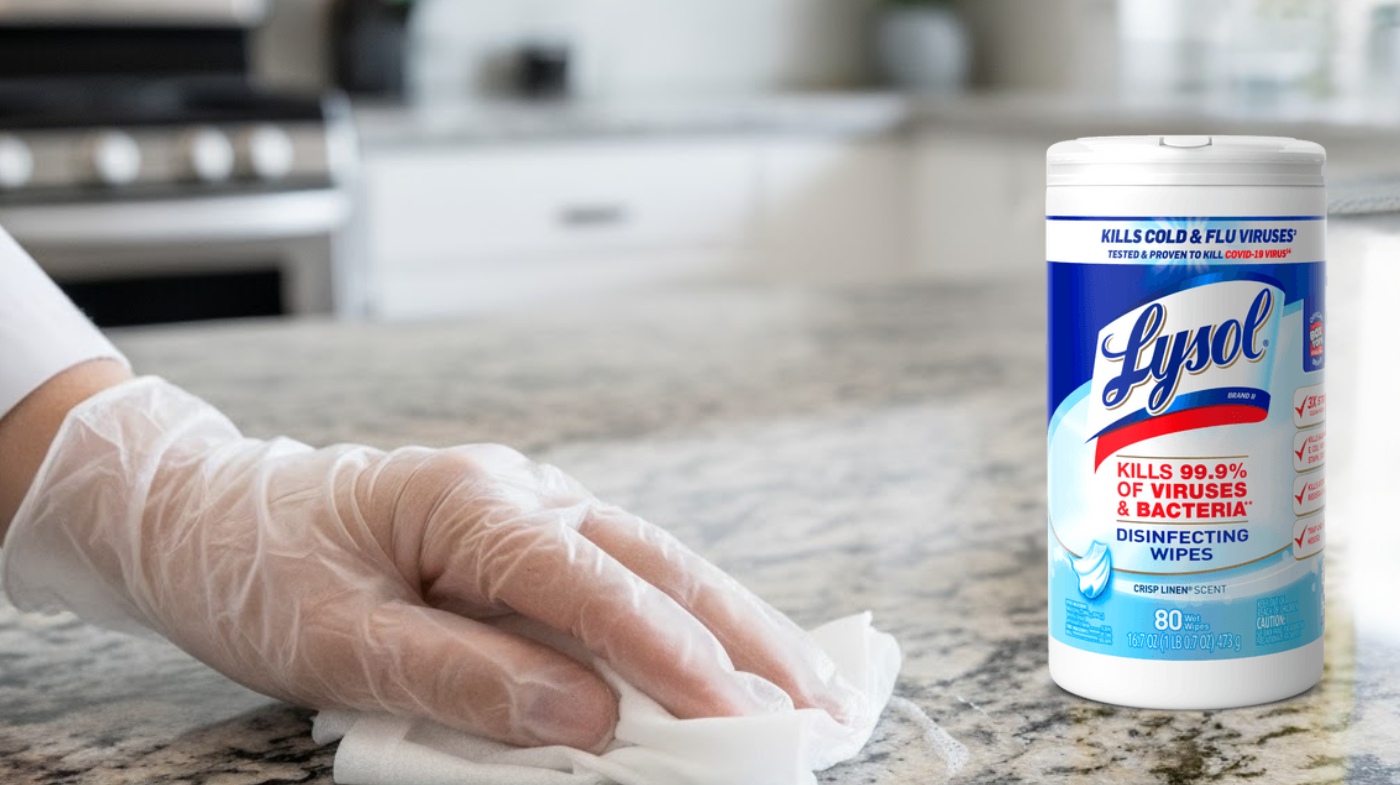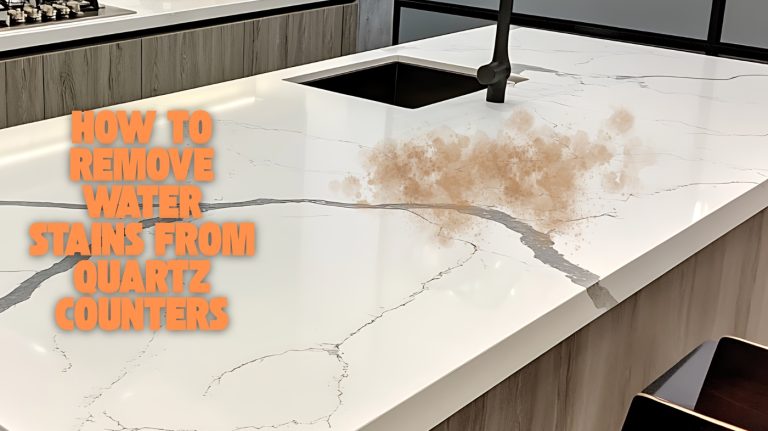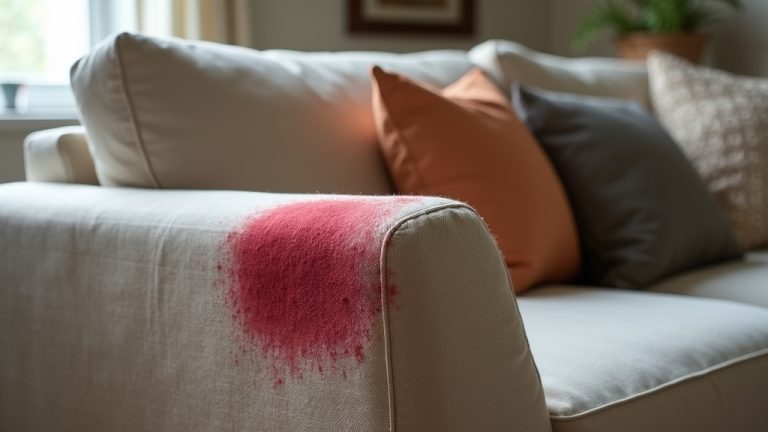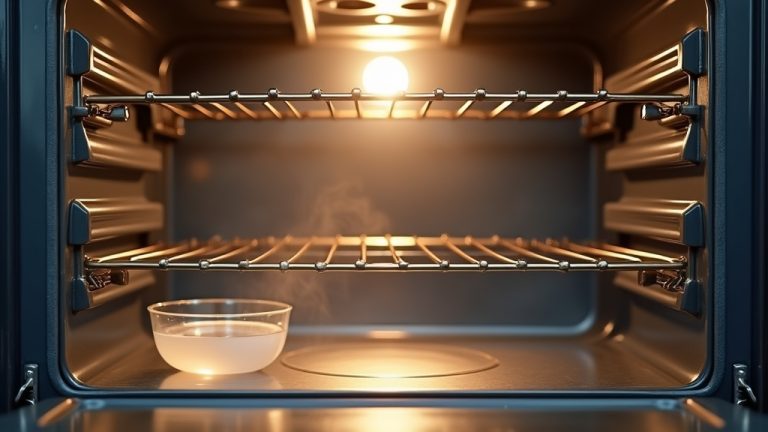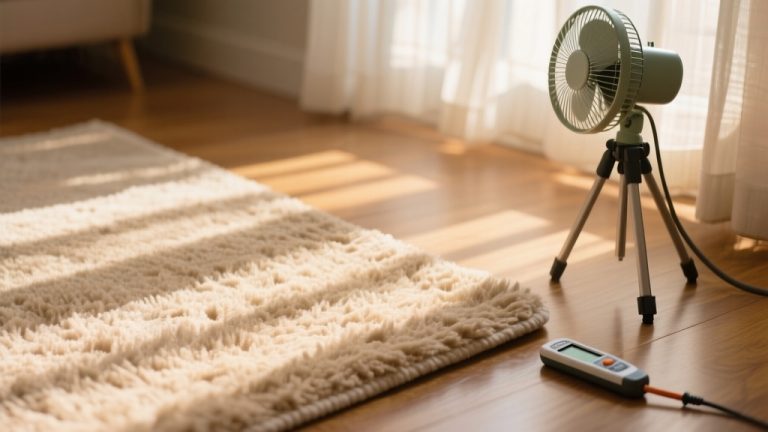Can You Use Lysol Wipes on Granite? Expert Advice Inside
You shouldn’t use Lysol wipes on granite because their harsh chemicals can damage the stone’s protective sealant, dull the finish, and cause discoloration or micro-cracks over time.
These wipes contain alcohols and strong disinfectants that strip away sealants, leaving your countertop vulnerable to stains and permanent surface damage.
Instead, opt for pH-balanced cleaners or stone-specific disinfectants to keep granite safe and looking pristine.
To understand proper cleaning and care, keep exploring expert-approved methods.
Key Takeaways
- Lysol wipes contain harsh chemicals that can damage granite’s protective sealant and dull its surface over time.
- Repeated use of Lysol wipes increases the risk of discoloration, micro-cracks, and weakened granite structural integrity.
- Harsh disinfectants like Lysol wipes strip sealants, requiring more frequent resealing and higher maintenance.
- Use pH-balanced cleaners, diluted isopropyl alcohol, or stone-specific disinfectants instead of Lysol wipes for safe cleaning.
- For granite longevity, clean gently with mild soap and water, and avoid disinfectant wipes that can degrade the stone.
Why Lysol Wipes Are Harmful to Granite Countertops?
Although Lysol wipes are convenient for quick cleaning, you should avoid using them on granite countertops. Their chemical ingredients can seriously harm the stone’s protective sealant.
When this sealant breaks down, your granite becomes vulnerable to staining and moisture penetration. This leads to permanent discoloration and dark spots. Using harsh chemicals can also leave streaks and damage the surface finish.
Repeated use of Lysol wipes accelerates sealant degradation, forcing you to reseal more often and increasing maintenance costs. Without the sealant, the granite’s surface also becomes more porous, inviting bacterial growth and unpleasant odors.
Additionally, continuous exposure can weaken the stone’s structural integrity, causing micro-cracks and chipping that require costly repairs. The harsh chemicals in Lysol, such as quaternary ammonium compounds, contribute to this gradual breakdown.
To preserve your granite’s durability, appearance, and value, it’s essential to avoid cleaning products like Lysol wipes that compromise its protective barrier and to use pH-neutral cleaners designed for stone surfaces instead.
Chemical Components in Lysol Wipes That Affect Granite
When you use Lysol wipes on granite, several chemical components actively interact with the stone’s surface and sealant, causing potential damage over time. Ethanol and isopropyl alcohol can dull the polished finish and weaken sealants.
Quaternary ammonium compounds may leave residue that attracts dirt and degrade surface oils. Potassium hydroxide’s alkalinity risks breaking down granite minerals, and phenolic antiseptics might discolor the stone.
These chemicals, even at low concentrations, cumulatively threaten granite’s integrity with frequent use. Proper maintenance routines and avoiding harsh chemicals like those found in Lysol wipes are essential to preserve the natural beauty and durability of stone surfaces such as granite and unlacquered brass.
| Chemical Component | Effect on Granite |
|---|---|
| Ethanol & Isopropyl Alcohol | Dulls surface, weakens sealants |
| Quaternary Ammonium Compounds | Leaves residue, may degrade surface oils |
| Potassium Hydroxide | Alters pH, breaks down minerals |
| Phenolic Antiseptics | Causes discoloration, residue buildup |
How Granite Sealants React to Harsh Cleaning Agents?
The chemical ingredients in Lysol wipes don’t just affect granite’s surface; they also interact with the sealants that protect it.
Harsh chemicals found in these wipes can degrade the sealant layer, compromising its ability to shield your granite from stains and damage. This degradation is similar to how harsh chemicals can damage vinyl flooring finishes, reducing their protective qualities.
When sealants break down, the stone beneath becomes porous and vulnerable.
Here’s what happens when harsh agents meet granite sealants:
Acidic and alkaline substances chemically erode and strip the protective sealant, causing dullness and surface roughness. Prolonged contact with alkaline cleaners like bleach and ammonia can also dull the granite’s shine.
Abrasive particles create micro-scratches that disrupt the sealant’s uniform coverage.
Prolonged exposure accelerates sealant deterioration, necessitating more frequent resealing to maintain granite’s durability.
To preserve your granite’s integrity, avoid cleaners that compromise sealants and understand how these chemicals accelerate wear and damage.
Safe Daily Cleaning Practices for Granite Surfaces
Maintaining your granite surfaces daily requires careful selection of cleaning methods and products to preserve their natural beauty and durability.
Use a soft sponge or dishrag with hot water for routine wiping to remove dirt without damage. Avoid cleaning with harsh chemicals or abrasive tools as these can cause damage similar to how ink stain removal requires gentle application.
Apply granite-friendly or mild dish soap-based cleaners via spray bottles, avoiding harsh chemicals that can dull or etch the stone.
Focus on high-touch areas near sinks and stoves, then dry and buff with a soft cloth to maintain shine and prevent water spots. Regular cleaning prevents buildup and supports long-term surface integrity.
Always choose pH-balanced, granite-specific cleaners or gentle homemade solutions.
Avoid abrasive tools and Lysol wipes, as they contain harmful chemicals.
Wipe spills immediately, especially acidic ones, and maintain a consistent cleaning schedule using lightly damp cloths for daily wipe-downs and mild soap mixtures a few times weekly.
Effective and Granite-Safe Disinfecting Alternatives
You’ve learned to avoid harsh chemicals and abrasive tools in daily granite cleaning, but disinfecting requires even more careful product selection to protect the stone’s integrity.
To disinfect granite safely and effectively, consider these alternatives:
Use stone-safe disinfectants formulated specifically for granite, such as Granite Gold Daily Cleaner or multi-action antimicrobial sprays free from bleach, ammonia, and acids.
Dilute isopropyl alcohol (70%) with water at a 1:1 ratio for a reliable disinfectant that won’t damage the sealant or surface.
For a natural approach, essential oil-based sprays (like tea tree or lavender oil) diluted in water provide antimicrobial benefits without compromising granite’s finish.
Always apply disinfectants lightly with a microfiber cloth, rinse thoroughly, and dry immediately to maintain the granite’s durability and appearance. This routine helps preserve the granite’s seal and prevents absorption of spills and bacteria. Regular maintenance and proper drying also help prevent issues like mold growth, which can occur if moisture is trapped on porous surfaces.
Long-Term Risks of Using Disinfectant Wipes on Granite
Although disinfectant wipes like Lysol offer convenience and antibacterial power, using them regularly on granite can seriously compromise your countertops over time.
Regular use of disinfectant wipes on granite can damage and degrade your countertops over time.
The citric acid and ammonia in these wipes break down granite sealant, eroding the protective layer and exposing the stone to damage.
This degradation increases porosity, leading to staining, surface etching, and dullness. Over time, micro-pitting and scratches may develop into permanent damage, reducing your granite’s gloss and structural integrity.
Frequent chemical exposure also accelerates sealant wear, requiring more frequent professional resealing, which raises maintenance costs. Granite is known for its high strength and durability, but only when properly cared for.
Using the wrong cleaning agents can also damage other surfaces and tracks in your home, highlighting the need for specialized cleaning tools and gentle maintenance.
Additionally, harsh residues pose health risks if ingested or inhaled.
To preserve your granite’s longevity and appearance, avoid habitual use of disinfectant wipes, as their harsh ingredients compromise both surface durability and your countertop’s lifespan.
Expert Advice on Maintaining Granite Countertops
Regular use of disinfectant wipes like Lysol can degrade your granite’s sealant and surface over time. Adopting the right care routine is essential to protect your investment.
To maintain your granite countertops effectively, focus on gentle daily cleaning and periodic maintenance. Here’s what you should do:
Clean daily with a microfiber cloth and mild soap, avoiding harsh chemicals to preserve the sealant. Always test cleaning solutions on a hidden area to ensure surface safety before full application.
Perform weekly deeper cleaning using granite-friendly, pH-neutral products to remove grease and residues.
Schedule annual water absorption tests to determine if resealing is necessary, ensuring long-term stain resistance and durability. It is important to reseal once a year or more frequently in high-use areas to maintain protection.
Additionally, avoid placing hot pots directly on granite. Wipe spills immediately, especially acidic liquids, to prevent damage.
Following these expert guidelines will keep your granite looking pristine and extend its lifespan.
Frequently Asked Questions
Can Lysol Wipes Damage Other Natural Stone Surfaces Besides Granite?
You know what they say, “An ounce of prevention is worth a pound of cure.”
Yes, Lysol wipes can damage other natural stones like marble, limestone, and travertine.
They cause etching, dulling, and sealant breakdown due to harsh acids and chemicals.
Using them risks permanent stains and discoloration.
Instead, you should opt for pH-neutral cleaners made for natural stone and always test products on a small, hidden spot first.
How Often Should Granite Countertops Be Resealed for Optimal Protection?
You should reseal your granite countertops at least once a year to maintain ideal protection, especially in high-use kitchens.
However, advanced sealants can extend this to 3–5 years depending on granite porosity and usage intensity.
Test sealant effectiveness regularly with the water droplet test and reseal when absorption occurs.
Frequent sealing won’t harm your granite, so err on the side of caution to preserve its durability and appearance.
Are There Specific Brands of Disinfectant Wipes Safe for Granite?
About 70% of disinfectant wipes on the market aren’t safe for granite, but you can rely on brands like Granite Gold® All-Surface Wipes and Tub O’ Towels.
These wipes are specifically formulated to clean and protect granite without damaging its seal.
When selecting wipes, always choose those labeled safe for “natural stone” or “sealed stone surfaces” to maintain your countertop’s durability and appearance while ensuring proper disinfection.
What Immediate Steps Should Be Taken if Granite Is Exposed to Lysol Wipes?
If your granite is exposed to Lysol wipes, immediately remove the wipes to prevent chemical damage.
Gently wipe the surface with a soft, damp microfiber cloth, then rinse thoroughly with clean water to dilute any acidic or ammonia residue.
Avoid scrubbing to protect the sealant.
Finally, pat dry with a soft towel to prevent water spots.
Inspect for any discoloration or dullness, and consider professional evaluation if damage appears significant.
Can Homemade Cleaning Solutions Harm Granite Countertops?
Just like a skilled gardener avoids harsh chemicals on delicate blooms, you shouldn’t use acidic or abrasive homemade cleaners on granite.
Ingredients like vinegar, lemon juice, or baking soda can damage its sealant or scratch the surface.
However, you can safely use diluted dish soap, rubbing alcohol, and essential oils.
Always test new mixtures on a hidden spot and wipe dry afterward to keep your granite looking pristine and protected.
Preserve Your Granite: Stop Using Lysol Wipes Today
You shouldn’t use Lysol wipes on granite, as their harsh chemicals can degrade sealants, leading to dullness and damage.
Studies show that nearly 60% of granite countertop damage results from improper cleaning agents like disinfectant wipes.
Instead, opt for pH-neutral cleaners specifically designed for stone surfaces to preserve your granite’s integrity and shine.
Following expert advice ensures your countertops stay beautiful and durable for years, protecting your investment effectively.

